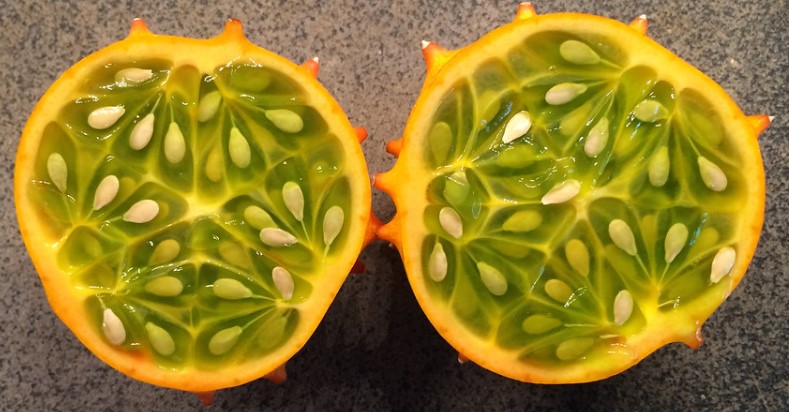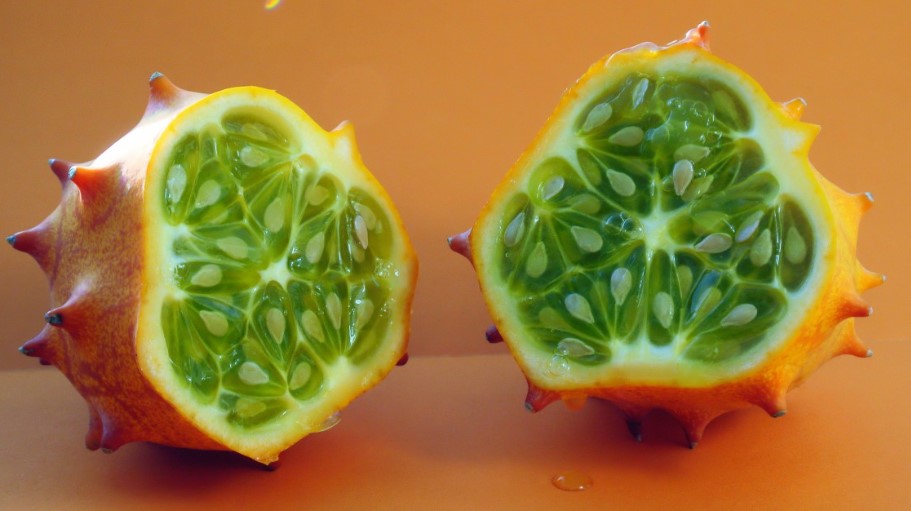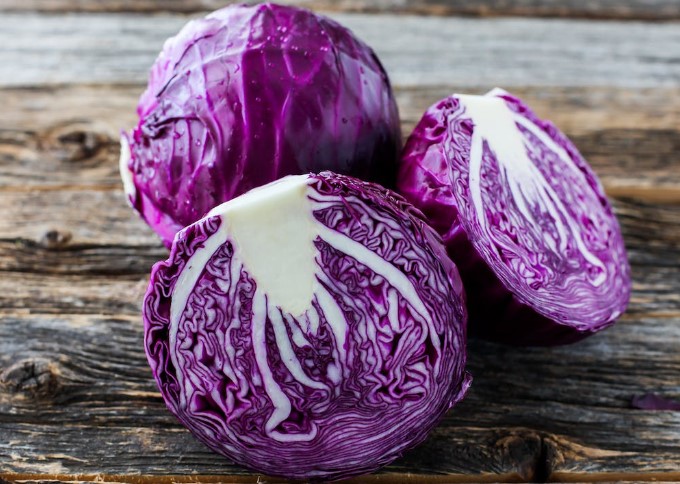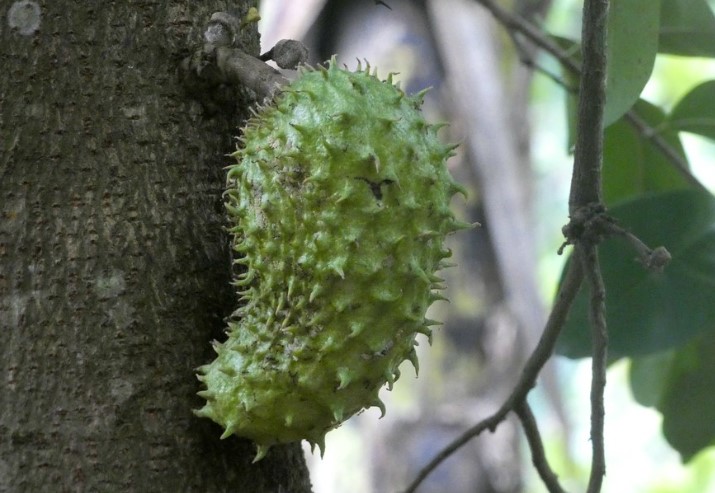Horned Melon and its Benefits
The horned melon, also known as the “kiwano,” is a fruit native to Africa. It has a bright orange, spiky exterior and a jelly-like interior with a slightly tart flavor. There are several names for Cucumis metuliferus. African horned cucumbers, horned melon, spiked melon, jelly melon, and kiwano are some of their names.
The fruit is high in vitamins C and A and also contains potassium, magnesium, and iron. Eating horned melon may have benefits such as boosting the immune system, improving skin health, and reducing inflammation. It is also a good source of antioxidants. The horned melon is a rich source of antioxidants, vitamins, and minerals, which can provide various health benefits. Some of the potential benefits include:
-
Boosting the immune system: Horned melon is high in vitamin C, which is known for its immune-boosting properties.
-
Improving skin health: The high levels of vitamin A in a horned melon can help to maintain healthy skin, nails, and hair.
-
Reducing inflammation: Horned melon contains anti-inflammatory compounds that may help to reduce inflammation throughout the body.
-
Lowering blood pressure: The high potassium content in horned melon may help to lower blood pressure and reduce the risk of heart disease.
How does horned melon taste and how do you eat it?
The horned melon has a unique taste that is often described as a combination of cucumber, banana, and lime. The jelly-like interior has a slightly tart flavor and a texture similar to that of a cucumber. The seeds inside the fruit are edible and have a nutty taste.
To eat a horned melon, slice off the top and bottom of the fruit and cut it in half. Scoop out the jelly-like interior with a spoon and discard the skin. You can eat the jelly-like flesh by itself or add it to salads, smoothies, or other dishes for a unique flavor. You can also mix it with other fruits or add it to yogurt, ice cream, or granola. If you want to eat the seeds, you can chew them or add them to a smoothie. The seeds have a crunchy texture.
Horned melon seeds:
The seeds of the horned melon are edible and have a nutty taste. They are also rich in minerals such as potassium, magnesium, and iron. They can be chewed or added to smoothies for added nutrition. It is worth noting that more research is needed to confirm the specific health benefits of horned melon and horned melon seeds. As always, it’s important to consult with a healthcare professional before making any major changes to your diet.

-
Can you eat kiwano melon seeds?
Yes, you can eat the seeds of the horned melon, also known as kiwano melon. The seeds are edible and have a nutty taste. They are rich in minerals such as potassium, magnesium, and iron. The seeds can be chewed or added to smoothies for added nutrition.
When consuming the seeds, it is important to be aware that they may be hard, so it’s better to chew them well before swallowing. Some people may find them too hard, so it’s better to blend them or grind them before adding them to smoothies or other dishes.
It is worth noting that some people may experience digestive discomfort after consuming the seeds, so it’s best to start with a small amount and see how your body reacts. If you experience any adverse effects, it is best to discontinue the consumption of the seeds.
It is always important to consult with a healthcare professional before making any major changes to your diet, particularly if you have any underlying health conditions.
Is kiwano melon poisonous?
The horned melon, also known as kiwano melon, is not poisonous. It is safe to eat and considered a healthy food due to its high levels of vitamins, minerals, and antioxidants. However, as with any food, it is important to be aware of any potential allergies or sensitivities you may have before consuming it. Additionally, it is best to consume it in moderation as excessive consumption may cause digestive upset. If you notice any adverse reactions after consuming the horned melon, it is best to discontinue consumption and seek medical attention if necessary.
Kiwano melon and pregnancy
There is currently no specific research on the safety of consuming horned melon or kiwano melon during pregnancy. However, as it is a food that is considered safe for consumption, it can be included in a healthy diet for pregnant women in moderation.
It is important for pregnant women to consume a balanced and nutritious diet that includes a variety of fruits and vegetables. Horned melon is a good source of vitamins and minerals such as vitamin C, vitamin A, potassium, magnesium, and iron, which are important for the health of both the mother and the baby during pregnancy.
However, it is always important to consult with a healthcare professional before making any major changes to your diet during pregnancy. They can provide personalized advice that takes into account any underlying health conditions or other factors that may affect your pregnancy.

Horned melon recipes
There are many ways to enjoy the unique flavor and texture of horned melon. Here are a few recipe ideas:
-
Horned Melon Sorbet: Scoop out the jelly-like flesh of the horned melon, blend it until smooth, and then freeze it in an ice cream maker. Serve as a refreshing sorbet on a hot summer day.
-
Horned Melon Salad: Cut the horned melon into small cubes, and mix with diced cucumber, mint leaves, and a squeeze of lime juice. Season with salt and pepper to taste.
-
Horned Melon Smoothie: Blend the horned melon flesh with other fruits such as berries or bananas, yogurt or milk, and some honey or agave syrup to taste.
-
Horned Melon Salsa: Blend together horned melon flesh, diced tomatoes, diced red onion, diced jalapeno pepper, cilantro, lime juice, and salt to taste. Serve with tortilla chips.
-
Horned Melon Juice: Blend horned melon flesh with other fruits such as orange, pineapple, or apple. strain the juice and serve chilled.
These are just a few ideas to incorporate horned melon in your meals and drinks, the possibilities are endless, let your imagination and taste buds guide you.
Horned Melon Germination:
Horned melon, is a fruit that is native to Africa and is grown in warm climates. The seeds of the horned melon can be used for germination to grow the plant. Here are some general guidelines for germinating horned melon seeds:
-
Soak the seeds in water for 24 hours prior to planting. This will help to soften the seed coat and increase the chances of successful germination.
-
Fill a seed tray or pots with well-draining seed compost.
-
Sow the seeds on the surface of the compost, spacing them out evenly.
-
Cover the seeds with a layer of vermiculite or fine grit to keep the moisture and warmth around the seeds.
-
Place the seed tray or pots in a propagator or cover them with a plastic bag to maintain a high level of humidity.
-
Keep the compost moist but not waterlogged and place the tray/pots in a warm, sunny spot, ideally at around 80°F (27°C)
-
Germination typically takes around 1-2 weeks. Once the seedlings are large enough to handle, transplant them into individual pots and grow them in a greenhouse or sunny windowsill.
-
When the seedlings are large enough and the weather is warm enough, transplant them into the ground or a bigger container.
Moreover, keep in mind that the horned melon plant requires a long growing season and warm temperatures. It may be challenging to grow in climates that do not provide the right conditions. It’s also imperative to note that germinating horned melon seeds may have a low success rate, so it’s best to start with a few seeds and see how they develop.







